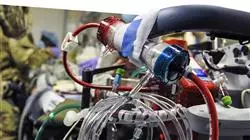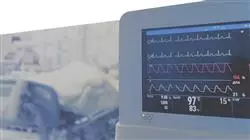University certificate
The world's largest faculty of medicine”
Introduction to the Program
The best Postgraduate certificate to update you in Trauma in Special Situations is available at TECH. Don't miss this opportunity and enroll now!”

Trauma in Special Situations represents a real challenge in the healthcare setting, as it involves the care of patients who have experienced critical events in out-of-the-ordinary circumstances. These situations can range from natural disasters and accidents to man-made incidents such as acts of violence.
The program will focus on the management of traumatic injuries in particular and challenging contexts. In this way, the specialist will look at special populations such as children, the elderly, pregnant women and chronically ill patients to ensure equitable and sensitive care. In addition, it will address specific protocols for critical situations, such as natural disasters, armed conflicts and massive traffic accidents.
In this context, the role of the professional will be to respond to trauma events in vulnerable communities and health systems. In this way, they will delve into triage strategies, resource coordination and interdisciplinary collaboration. Likewise, the specialist will acquire advanced skills in the management of trauma in particular contexts, improving the capacity of response and care in challenging and unique situations.
Therefore, it will be essential to recognize the complexity of physiological and psychological responses to traumatic events in special situations. In fact, the medical personnel who will respond to these cases must be prepared to manage not only the immediate physical injuries, but also the long-term mental health implications for those affected.
With this in mind, the Postgraduate certificate in Trauma in Special Situations will provide the graduate with a solid theoretical foundation, accompanied by its application in critical real-world situations. With the leadership and support of a distinguished faculty of experts in Internal Medicine, the best academic results are guaranteed. TECH offers exclusive access to the most advanced learning methodology: Relearning, an innovative pedagogical technique based on the repetition of key concepts, thus facilitating an effective assimilation of all knowledge.
You will analyze a comprehensive approach to Trauma in Special Situations, which considers both medical and psychosocial aspects"
This Postgraduate certificate in Trauma in Special Situations contains the most complete and up-to-date scientific program on the market. The most important features include:
- Case studies presented by experts in Trauma in Special Situations
- The graphic, schematic, and practical contents with which they are created, provide scientific and practical information on the disciplines that are essential for professional practice
- Practical exercises where the self-assessment process can be carried out to improve learning
- Its special emphasis on innovative methodologies
- Theoretical lessons, questions to the expert, debate forums on controversial topics, and individual reflection assignments
- Content that is accessible from any fixed or portable device with an Internet connection
You will delve into the special case of Trauma in the anticoagulated patient, all thanks to the most innovative multimedia content"
The program’s teaching team includes professionals from the field who contribute their work experience to this educational program, as well as renowned specialists from leading societies and prestigious universities.
Its multimedia content, developed with the latest educational technology, will allow the professional a situated and contextual learning, that is, a simulated environment that will provide an immersive education programmed to learn in real situations.
This program is designed around Problem-Based Learning, whereby the professional must try to solve the different professional practice situations that arise during the academic year For this purpose, the students will be assisted by an innovative interactive video system created by renowned and experienced experts.
You will explore Trauma in the pregnant woman and the most common non-obstetric causes of death, such as car accidents and gender violence"

You will address how emergency medical care is organized to care for multiple disaster victims. And in only 6 weeks!"
Why study at TECH?
TECH is the world’s largest online university. With an impressive catalog of more than 14,000 university programs available in 11 languages, it is positioned as a leader in employability, with a 99% job placement rate. In addition, it relies on an enormous faculty of more than 6,000 professors of the highest international renown.

Study at the world's largest online university and guarantee your professional success. The future starts at TECH”
The world’s best online university according to FORBES
The prestigious Forbes magazine, specialized in business and finance, has highlighted TECH as “the world's best online university” This is what they have recently stated in an article in their digital edition in which they echo the success story of this institution, “thanks to the academic offer it provides, the selection of its teaching staff, and an innovative learning method aimed at educating the professionals of the future”
A revolutionary study method, a cutting-edge faculty and a practical focus: the key to TECH's success.
The most complete study plans on the university scene
TECH offers the most complete study plans on the university scene, with syllabuses that cover fundamental concepts and, at the same time, the main scientific advances in their specific scientific areas. In addition, these programs are continuously being updated to guarantee students the academic vanguard and the most in-demand professional skills. In this way, the university's qualifications provide its graduates with a significant advantage to propel their careers to success.
TECH offers the most comprehensive and intensive study plans on the current university scene.
A world-class teaching staff
TECH's teaching staff is made up of more than 6,000 professors with the highest international recognition. Professors, researchers and top executives of multinational companies, including Isaiah Covington, performance coach of the Boston Celtics; Magda Romanska, principal investigator at Harvard MetaLAB; Ignacio Wistumba, chairman of the department of translational molecular pathology at MD Anderson Cancer Center; and D.W. Pine, creative director of TIME magazine, among others.
Internationally renowned experts, specialized in different branches of Health, Technology, Communication and Business, form part of the TECH faculty.
A unique learning method
TECH is the first university to use Relearning in all its programs. It is the best online learning methodology, accredited with international teaching quality certifications, provided by prestigious educational agencies. In addition, this disruptive educational model is complemented with the “Case Method”, thereby setting up a unique online teaching strategy. Innovative teaching resources are also implemented, including detailed videos, infographics and interactive summaries.
TECH combines Relearning and the Case Method in all its university programs to guarantee excellent theoretical and practical learning, studying whenever and wherever you want.
The world's largest online university
TECH is the world’s largest online university. We are the largest educational institution, with the best and widest online educational catalog, one hundred percent online and covering the vast majority of areas of knowledge. We offer a large selection of our own degrees and accredited online undergraduate and postgraduate degrees. In total, more than 14,000 university degrees, in eleven different languages, make us the largest educational largest in the world.
TECH has the world's most extensive catalog of academic and official programs, available in more than 11 languages.
Google Premier Partner
The American technology giant has awarded TECH the Google Google Premier Partner badge. This award, which is only available to 3% of the world's companies, highlights the efficient, flexible and tailored experience that this university provides to students. The recognition as a Google Premier Partner not only accredits the maximum rigor, performance and investment in TECH's digital infrastructures, but also places this university as one of the world's leading technology companies.
Google has positioned TECH in the top 3% of the world's most important technology companies by awarding it its Google Premier Partner badge.
The official online university of the NBA
TECH is the official online university of the NBA. Thanks to our agreement with the biggest league in basketball, we offer our students exclusive university programs, as well as a wide variety of educational resources focused on the business of the league and other areas of the sports industry. Each program is made up of a uniquely designed syllabus and features exceptional guest hosts: professionals with a distinguished sports background who will offer their expertise on the most relevant topics.
TECH has been selected by the NBA, the world's top basketball league, as its official online university.
The top-rated university by its students
Students have positioned TECH as the world's top-rated university on the main review websites, with a highest rating of 4.9 out of 5, obtained from more than 1,000 reviews. These results consolidate TECH as the benchmark university institution at an international level, reflecting the excellence and positive impact of its educational model.” reflecting the excellence and positive impact of its educational model.”
TECH is the world’s top-rated university by its students.
Leaders in employability
TECH has managed to become the leading university in employability. 99% of its students obtain jobs in the academic field they have studied, within one year of completing any of the university's programs. A similar number achieve immediate career enhancement. All this thanks to a study methodology that bases its effectiveness on the acquisition of practical skills, which are absolutely necessary for professional development.
99% of TECH graduates find a job within a year of completing their studies.
Postgraduate Certificate in Trauma in Special Situations
Trauma management in special situations presents unique challenges that require a specialized and highly competent approach. Would you like to obtain the necessary tools to perform in this field? TECH Global University has the ideal option for you. We present the Postgraduate Certificate in Trauma in Special Situations, a high-level program that will equip you with the necessary skills and knowledge to face these critical circumstances with confidence and effectiveness. Our program, delivered 100% online, will take you beyond the basics and provide you with an in-depth knowledge of the specific injuries encountered in special situations. This Postgraduate Certificate focuses on trauma management in settings beyond standard hospital care. Therefore, you will learn how to deal with scenarios such as natural disasters, mass transportation accidents, combat situations and more. Thus, you'll be prepared to competently address complex trauma.Trauma and Trauma Management.
Learn about trauma in special situations
This Postgraduate Certificate will open doors to a variety of career opportunities. You'll be able to work in humanitarian relief organizations, disaster response teams, armed forces and more. In addition, your expertise in trauma management in special situations will be highly valued in the field of emergency medicine and critical care. As you progress through the curriculum, you will be provided with a theoretical-practical methodology, through which you will perform realistic exercises that closely replicate situations you might encounter in the field. This will allow you to develop the necessary skills to make critical decisions under pressure. You will also learn to collaborate effectively with professionals from a variety of disciplines, including physicians, nurses, paramedics and emergency response experts, and learn to work as a team in special situations. Finally, we will prepare you to adapt quickly to changing and dynamic circumstances, a critical skill in managing trauma in special situations. If you want to learn more, take the plunge and enroll now.







